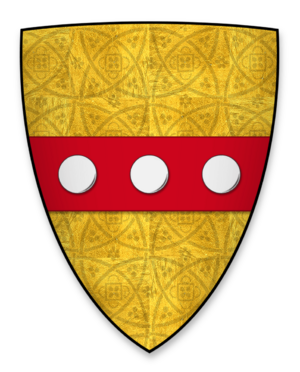William of Huntingfield facts for kids
William of Huntingfield (died around 1225) was a powerful English noble during the Middle Ages. He was a Sheriff of Norfolk and Suffolk, which meant he was in charge of law and order for those areas. William was also one of the important people who promised to make sure King John followed the rules of the Magna Carta.
He was given the job of protecting Dover Castle for King John starting in 1203. This castle was very important for defending England. To make sure William stayed loyal, King John took his son and daughter as hostages. William also received lands that had been taken from his brother. He served as the Sheriff of Norfolk and Suffolk in 1210 and 1211. Later, during a time of war called the First Barons' War, William fought against King John. He was one of twenty-five barons chosen to make sure the king followed the rules written in the Magna Carta.
After this, William supported a French invasion of England. He later joined a big journey called the Fifth Crusade, which was a religious military trip. He died during this crusade.
Contents
Who Was William of Huntingfield?
William of Huntingfield was a significant figure in medieval England. He was a baron, which meant he was a powerful landowner and a direct subject of the king. His life was full of important events, including wars, political changes, and even a major religious journey.
Early Life and Important Roles
William was the son of Roger de Huntingfield and Alice de Senlis. His mother, Alice, came from a noble family, being the granddaughter of Simon, Earl of Huntingdon and Northampton. This family background gave William a strong position in society.
One of William's key roles was protecting Dover Castle. This castle was a vital fortress, guarding the English coast from invaders. King John trusted William with this important job. To ensure William's loyalty, the king held William's children as a guarantee. This was a common practice at the time to secure loyalty from powerful nobles. William also became the Sheriff of Norfolk and Suffolk, responsible for keeping peace and collecting taxes in those regions.
The Magna Carta and Rebellion
William of Huntingfield played a major part in the events leading to the Magna Carta. This document was a very important agreement that limited the king's power and protected the rights of his subjects. Many barons, including William, were unhappy with King John's rule. They felt he was unfair and abused his power.
This disagreement led to the First Barons' War. William actively rebelled against King John. After much conflict, the Magna Carta was signed in 1215. William was one of the twenty-five barons chosen to make sure King John actually followed the rules written in the Magna Carta. This showed how much trust the other barons had in him.
Later Years and the Crusades
Even after the Magna Carta, the conflicts in England continued. William later supported a French invasion of England. This was a complex time, with many nobles changing sides based on their beliefs and interests.
Eventually, William joined the Fifth Crusade. Crusades were military expeditions by European Christians to the Middle East, often aimed at taking control of holy lands. William traveled far from England to participate in this religious war. He died during this crusade, around the year 1225.
His Family
William of Huntingfield married a woman named Isabel. Isabel was the daughter of William Fitz Roger of Gressinghall, Norfolk. Before marrying William, Isabel had been married twice before. Her first husband was Berenger de Cressy, and her second was Osmund de Stuteville.
William and Isabel had a large family together. They had two sons and four daughters. William's elder son, Roger, took over his father's lands and titles after William passed away.
 | Stephanie Wilson |
 | Charles Bolden |
 | Ronald McNair |
 | Frederick D. Gregory |


